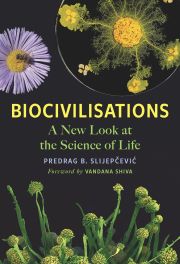Biocivilisations: A New Look at the Science of Life

Predrag B Slijepčević
Chelsea Green Publishing, £20.00
If you accept Karl Popper’s theory of falsification as the way that science progresses – then be prepared to challenge the idea of evolution being exclusively driven by natural selection in a classical sense when you pick up Biocivilisations. If you are ready to look deeper into the Gaia hypothesis, where organisms co-evolve with and exist in a reciprocal relationship with their abiotic environment, rich delights are in store, as we are taken on a voyage of enlightenment and discovery through a variety of civilisations that have arisen among the domains and kingdoms of the biosphere.
Biologist and author Predrag Slijepčević urges us to recognise that as humans, we are little more than a ripple on the surface of the vast river of life, and if we think we could have been masters over life on Earth in the Anthropocene age, we are deluding ourselves.
He builds an argument that civilisations have periodically arisen in evolutionary history, sometimes facilitated along Lamarckian lines. These biocivilisations are evidenced through phenomena including ‘communication’, ‘engineering’ to alter the environment, discovery through ‘scientific’ trial and error, ‘medical care’ demonstrated by several mammals in the form of intentional self-medication, ‘artistry’ by pufferfish and weaver birds and ‘farming’ by certain social insects.
As education plays a significant role in maintaining most societies, it would have been interesting to have a chapter dedicated to teaching and learning within different kingdoms. Similarly, most social scientists would agree that some form of governance is of key importance for societies, yet little reference is made to it in this book. There were also times when points were repeated and others when it appeared there was a leap in the argumentation.
Nonetheless, this is a seriously thought-provoking volume. Can biology be reduced to merely mechanistic physics or chemistry? Or is life based on Gaian autopoiesis, homeorhesis and hyperthought? Biocivilisations will enlighten your thoughts as you ponder this dilemma.
Dr Alex Waller FRSB


